|
|
|
Sort Order |
|
|
|
Items / Page
|
|
|
|
|
|
|
| Srl | Item |
| 1 |
ID:
156609
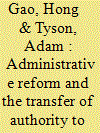

|
|
|
|
|
| Summary/Abstract |
In this article, we examine the administrative functions that have been carried out by social organizations (SOs) in China since 2013. We use evidence from Guangdong to demonstrate that the transfer of authority to SOs is selective, tends to create more burdens for local government, and generally does not lead to greater autonomy for SOs. We focus on five types of SOs that are undertaking new administrative functions with varying degrees of operational autonomy, which relates to the consultative authoritarian model proposed by Jessica Teets. Consultative authoritarianism allows for the expansion of relatively autonomous SOs and the development of indirect state control mechanisms. The model is designed to improve governance without democratization by expanding the role played by intermediaries such as SOs in public administration and service delivery. The evidence from Guangdong permits us to conclude that the transfer of authority to SOs allows for innovations in public administration, but that politics continues to motivate government decisions as to which functions are suitable for SOs to undertake, casting doubt on the ability of the Chinese Communist Party to achieve sustainable improvements in local governance and public service provision.
|
|
|
|
|
|
|
|
|
|
|
|
|
|
|
|
| 2 |
ID:
156608
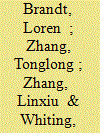

|
|
|
|
|
| Summary/Abstract |
Through two rounds of land contracting, rural households have been allocated a bundle of rights in land. We observe significant differences across villages in the amount of land to which villagers retain a claim and the institutional mechanisms governing the exchange of land rights. This study reveals the perpetuation and expansion of non-market mechanisms accruing to the benefit of village cadres and state officials and only limited emergence of market mechanisms in which households are primary beneficiaries. It identifies factors in economic, political and legal domains that incentivize and enable state officials and local cadres to capture returns from use of land. Relatedly, the study finds differences in conflict over property-rights regimes. Drawing on a pilot survey carried out by the authors in November of 2011 in Shaanxi and Jiangsu provinces (192 households in 24 villages), this paper seeks to explain heterogeneity and change in property-rights regimes over time and across space.
|
|
|
|
|
|
|
|
|
|
|
|
|
|
|
|
| 3 |
ID:
156603
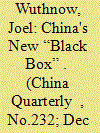

|
|
|
|
|
| Summary/Abstract |
China's establishment of a Central National Security Commission (CNSC) in late 2013 was a potentially transformative event in the evolution of China's national security decision-making structure. Yet, as of mid-2017, few details about this organization and its activities have been released, leading to continuing questions about its likely role and functions in the Chinese system. Based on an analysis of numerous authoritative but under-utilized Chinese sources, this article addresses the rationale, prospects and implications of the CNSC. It argues that the organization is both a fulfilment of a long-held desire by many in China for a centralized, permanent national security deliberation forum and also a reflection of the unique challenges facing China in the 21st century. Contrary to existing analyses, which argue that the CNSC is likely to be focused primarily on domestic security tasks, the article contends that it is more likely to play a major role in both internal and external security affairs. Moreover, the article argues that if certain obstacles can be addressed, the CNSC may have broad implications in areas ranging from China's crisis response capability to the role played by the Chinese Communist Party general secretary in the national security decision-making process. The conclusion recaps the findings and suggests avenues for further research.
|
|
|
|
|
|
|
|
|
|
|
|
|
|
|
|
| 4 |
ID:
156610


|
|
|
|
|
| Summary/Abstract |
Using an institutional perspective, this paper explores coexisting job search methods in reforming China. Analysis of the 2003 Chinese General Social Survey data shows that China's labour markets are segmented into institutional niches by two key factors: the type of ownership of work organization and the status of the work organization in the market. The effectiveness of job search methods varies across the different institutional niches. Hierarchical arrangements and social networks remain powerful means of obtaining jobs in the state sector, including both monopolistic and competitive work organizations, while job searches using a market-oriented method are comparatively useful for winning jobs in the non-state sector irrespective of whether organizations are competitive or monopolistic in terms of market competition. This paper not only illustrates the value of an institutional approach to labour market research but also reveals the scope of market penetration in China's emerging labour markets.
|
|
|
|
|
|
|
|
|
|
|
|
|
|
|
|
| 5 |
ID:
156601


|
|
|
|
|
| Summary/Abstract |
The People's Liberation Army (PLA) has been undergoing a profound transformation in terms of its operational capabilities, both with regard to its hardware as well as its heartware, i.e. the softer aspects of its development including its operational culture and military ethos. These changes have permeated every facet of the PLA – technological, organizational and doctrinal. Despite successive generations of Chinese leaders having declared their adherence to “peace” and “development,” it has become clearer that Beijing's security policy under Xi Jinping has shifted steadily away from “keeping a low profile.” In that regard, the status of the PLA in the domestic and international calculus of China's new commander-in-chief has, unsurprisingly, become more pronounced, with Xi taking noticeably greater interest in harnessing the Chinese Communist Party's coercive forces as his personal domestic powerbase and foreign policy instrument complementing China's hard economic power.
|
|
|
|
|
|
|
|
|
|
|
|
|
|
|
|
| 6 |
ID:
156604
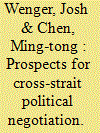

|
|
|
|
|
| Summary/Abstract |
This study adopts a pre-negotiation approach based on Robert Putnam's win-set concept to examine domestic constraints on cross-Strait political negotiation. Survey research of elite opinion in both China and Taiwan and of public opinion in Taiwan is used to estimate each side's win-set (that is, the set of political negotiation outcomes that could win majority approval domestically) during Ma Ying-jeou's second presidential term in Taiwan (2012–2016). The possibility for overlap in win-sets that could provide a zone of possible agreement and the potential for coalitions in favour of negotiation are analysed. The study finds no win-set overlap and limited potential for coalitions favouring negotiation outcomes with the least distance from overlap, concluding that domestic conditions for formal political negotiations between Beijing and Taipei are unlikely to be ripe in the near term.
|
|
|
|
|
|
|
|
|
|
|
|
|
|
|
|
| 7 |
ID:
156607
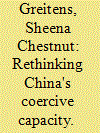

|
|
|
|
|
| Summary/Abstract |
Discussions of China's rising domestic security expenditure often present this spending as evidence of the Chinese Communist Party's strong coercive capacity. This article argues that a lack of theoretical clarity about domestic security has resulted in flawed conclusions about these expenditures and their implications for China's coercive capacity. Challenging the conventional wisdom, the article analyses China's domestic security spending from 1992 through 2012 and argues that it is important to consider not only the total amount that China spends but also how it spends these resources and the magnitude of the threats that this expenditure must address. It finds that China's domestic security spending is not historically unprecedented, is not expanding as a proportion of national expenditure, and is not necessarily high (or producing high coercive capacity) when compared to other countries. The article also shows that certain locations struggle more to fund their coercive capacity than others, and that these locations overlap with areas where internal security threats may be particularly acute. The challenges that the coercive apparatus must address have also grown over the same period during which domestic security spending has risen. Finally, attempts to improve the political position of China's coercive agents cannot be equated with improvements in their capacity to manage Chinese society. Cumulatively, this reassessment provides more evidence of the limitations on China's coercive capacity than of its strength.
|
|
|
|
|
|
|
|
|
|
|
|
|
|
|
|
| 8 |
ID:
156606
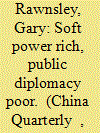

|
|
|
|
|
| Summary/Abstract |
Accepting that Taiwan has accumulated “soft power” since the introduction of democratic reforms in the late 1980s, this paper assesses Taiwan's external communications during Ma Ying-jeou's presidency and how its soft power resources have been exercised. Demonstrating the strategic turn from political warfare to public and cultural diplomacy, the paper begins with the premise that the priority must be to increase familiarity with Taiwan among foreign publics. It then argues that any assessment of external communications in the Ma administration must consider the impact of two key decisions: first, the dissolution of the Government Information Office and the transfer of its responsibilities for international communications to the Ministry of Foreign Affairs and a new Ministry of Culture, and second, the priority given to cultural themes in Taiwan's external communications.
|
|
|
|
|
|
|
|
|
|
|
|
|
|
|
|
| 9 |
ID:
156605
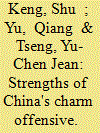

|
|
|
|
|
| Summary/Abstract |
China's trade with Taiwan has a political motive: winning the hearts and minds of the Taiwanese people. The effectiveness of China's economic statecraft can be examined in the Syuejia (Xuejia) case, where Taiwan put up strong resistance to the generous benefits offered by China. This article investigates the political implications of the Chinese-designed contract farming programme in Syuejia and argues that if economic favours are delivered, and positive impressions also created, political attitudes can be revised. Without these two prerequisites, however, replicating the Syuejia results elsewhere and thus disturbing the cross-Strait status quo will be difficult. When put in a theoretical context, the changes in the political landscape of Syuejia illustrate the interplay of economic interests and political identity.
|
|
|
|
|
|
|
|
|
|
|
|
|
|
|
|
| 10 |
ID:
156602
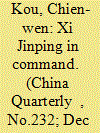

|
|
|
|
|
| Summary/Abstract |
The PLA has been a key player in Chinese elite politics since 1949. However, a series of developments over the last four years has prompted China watchers to re-evaluate Party–military relations. This paper argues that CCP–PLA relations in the Xi Jinping era are characterized by the centralization of power in a single civilian individual. This centralization is reflected by events such as a new emphasis on the CMC chairman responsibility system, the establishment of new coordination bodies under the top leader, radical reforms to the military command structure, the promotion of Xi's public image as the top leader, and large-scale personnel reshuffes during which Xi's trustees have gradually come to occupy key military posts while his rivals have been removed. For Xi, these measures are an antidote to the principal–agent problem in CCP–PLA relations caused by both information asymmetry and the discrepant interests of civilian leaders and the top brass of the PLA.
|
|
|
|
|
|
|
|
|
|
|
|
|
|
|
|
| 11 |
ID:
156611
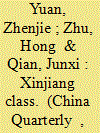

|
|
|
|
|
| Summary/Abstract |
The Xinjiang Class (Xinjiang neidi ban, or Xinjiangban) has far-reaching implications for Beijing's governance of ethnic minorities in Xinjiang. Existing literature has focused primarily on the Uyghur–Han dichotomy, with limited attention being paid to the actual multi-ethnic interactions that constitute the situated dynamics of policy implementation. Utilizing the notions of the space of prescription and the space of negotiation to develop an analytical framework, this paper argues that social relations in the Xinjiangban are ongoing constructions borne by everyday experiences of domination and negotiation, and that space is constitutive of this situated dynamic. Based on nearly four years of research at a Xinjiangban, we make a case for the fluidity and incoherence of the implementation of the Xinjiangban policy. Those who implement it at the school level produce a space of prescription that deploys specific spatial–temporal arrangements to manage expressions of ethnic identity. Driven by the need to achieve upward mobility, minority students are open-minded about the Han- and patriotism-centred education. However, they use innovative and improvised tactics to create spaces of negotiation to re-assert their ethnicities. In the Xinjiangban, minority students do comply with spaces of prescription, but they simultaneously keep their ethnic and religious practices alive.
|
|
|
|
|
|
|
|
|
|
|
|
|
|
|
|
|
|
|
|
|